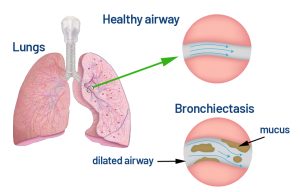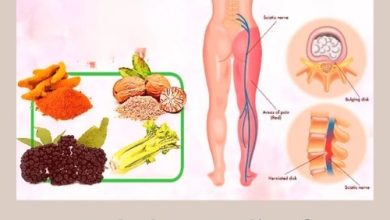Say Goodbye to Bronchiectasis: Effective Remedies You Must Try

Bronchiectasis is a chronic lung condition that causes irreversible widening of the airways, leading to mucus buildup and recurring lung infections. If you or a loved one is dealing with this condition, you know how it can affect daily life and overall well-being. While medical treatments and therapies are crucial, many are turning to natural solutions to complement their care. In this article, we explore the best natural treatment for bronchiectasis that can help alleviate symptoms and improve lung health.
What is Bronchiectasis?
Bronchiectasis is a chronic lung condition characterized by the permanent widening and damage of the airways, known as bronchi. This structural change impairs the ability of the lungs to clear mucus, leading to recurrent infections and respiratory complications. Bronchiectasis can affect people of all ages, but it is more commonly diagnosed in older adults.
Related Articles: 9 Natural Treatment for Bronchiectasis
Causes of Bronchiectasis
Bronchiectasis can develop as a result of various underlying conditions, including:
- Infections: Severe respiratory infections such as pneumonia, tuberculosis, or whooping cough can lead to bronchiectasis.
- Immune System Disorders: Conditions that weaken the immune system increase susceptibility to infections that may contribute to bronchiectasis.
- Genetic Disorders: Cystic fibrosis is a well-known genetic cause of bronchiectasis. Primary ciliary dyskinesia is another genetic condition linked to the disease.
- Airway Blockages: Tumors, foreign objects, or mucus plugs that obstruct the airways can result in localized bronchiectasis.
- Autoimmune Diseases: Rheumatoid arthritis and other autoimmune diseases can increase the risk of developing bronchiectasis.
Symptoms of Bronchiectasis
The symptoms of bronchiectasis can vary in severity and may include:
- Chronic cough
- Production of large amounts of sputum (mucus)
- Shortness of breath
- Wheezing
- Chest pain
- Fatigue
- Recurrent lung infections
Over time, if left untreated, bronchiectasis can lead to respiratory failure and other complications.
Effective Natural Treatments for Bronchiectasis
Here are several natural treatments for bronchiectasis that can support respiratory health and help manage symptoms effectively:

1. Breathing Exercises and Airway Clearance Techniques
Breathing exercises, such as those practiced in yoga or pulmonary rehabilitation, can strengthen lung function and help clear mucus. Techniques like postural drainage and chest physiotherapy aid in expelling mucus from the airways, reducing the risk of infection.
Related Articles: Taking Control of Bronchiectasis with Herbal Medicines
2. Steam Therapy
Inhaling steam can loosen thick mucus, making it easier to cough up. Adding essential oils such as eucalyptus or peppermint enhances the benefits, providing anti-inflammatory and antimicrobial properties.
3. Herbal Remedies
Certain herbs have shown promise in improving lung health. Licorice root, ginger, and turmeric possess anti-inflammatory and immune-boosting properties that may reduce airway inflammation and support overall respiratory function.
4. Hydration
Staying well-hydrated is essential for thinning mucus, which facilitates easier expulsion. Warm teas, soups, and regular water intake play a crucial role in keeping airways clear.
Related Articles: Best Sleeping Position for Bronchiectasis: Improve Your Breathing and Comfort
5. Healthy Diet
A nutrient-rich diet packed with antioxidants can strengthen the immune system and combat infections. Include foods rich in vitamin C, vitamin D, and omega-3 fatty acids to reduce inflammation and promote healing.
6. Salt Therapy (Halotherapy)
Salt therapy involves inhaling salt-infused air, which can help clear mucus and improve respiratory function. This natural therapy may also reduce inflammation and bacteria in the lungs.
Lifestyle Changes to Support Lung Health
Maintaining healthy lungs is crucial for overall well-being and quality of life. By adopting certain lifestyle habits, you can improve lung function, reduce the risk of respiratory diseases, and enhance your body’s ability to oxygenate efficiently. Here are some effective lifestyle changes to support lung health:
Related Articles: New Treatments for Bronchiectasis: Hope for a Better Life
- Quit Smoking and Avoid Secondhand Smoke Smoking is the leading cause of lung disease, including chronic obstructive pulmonary disease (COPD) and lung cancer. Quitting smoking significantly improves lung health and reduces the risk of developing these conditions. Additionally, avoiding secondhand smoke is vital as it can also contribute to lung problems.
- Exercise Regularly Engaging in regular physical activity helps improve lung capacity and efficiency. Aerobic exercises, such as walking, jogging, swimming, and cycling, strengthen the lungs by enhancing the oxygen exchange process. Aim for at least 30 minutes of moderate exercise most days of the week.
- Maintain Good Indoor Air Quality Indoor pollutants, such as dust, mold, and chemicals, can negatively affect lung health. Use air purifiers, ensure proper ventilation, and avoid using products with strong fumes. Keeping your home clean and free from allergens can help protect your respiratory system.
- Practice Breathing Exercises Breathing exercises, such as diaphragmatic and pursed-lip breathing, can improve lung function, especially for individuals with existing respiratory conditions. These techniques promote better oxygen flow and strengthen the respiratory muscles.
- Stay Hydrated Drinking plenty of water helps keep the mucosal lining in the lungs thin, facilitating better breathing and mucus clearance. Proper hydration supports overall lung function and prevents irritation.
- Avoid Exposure to Pollutants Minimize exposure to outdoor pollution, such as car exhaust and industrial fumes. On high pollution days, stay indoors and use masks if necessary. Reducing exposure to harmful particles helps prevent lung irritation and inflammation.
- Get Vaccinated Vaccinations, such as the flu shot and pneumococcal vaccine, protect against infections that can lead to serious lung complications. Keeping up with recommended immunizations is essential, particularly for older adults and those with underlying health conditions.
- Maintain a Healthy Diet A nutrient-rich diet supports lung health by reducing inflammation and providing antioxidants. Include fruits, vegetables, whole grains, and lean proteins in your meals. Foods rich in vitamins C and E, such as citrus fruits and nuts, are particularly beneficial for lung function.
- Monitor Your Health Regular check-ups and lung function tests can help detect potential issues early. Seek medical attention if you experience persistent coughing, shortness of breath, or chest discomfort.
By incorporating these lifestyle changes, you can promote lung health, enhance respiratory efficiency, and reduce the risk of lung-related diseases.
Final Thoughts
While bronchiectasis requires ongoing medical management, incorporating natural treatments can enhance overall health and symptom control. By adopting a holistic approach that includes breathing exercises, herbal remedies, and a nutrient-rich diet, you can take proactive steps toward better lung health. Always consult with a healthcare professional before starting any new treatment to ensure it complements your existing care plan.
Try these Herbal Treatment for Bronchiectasis and take a positive step toward improved respiratory health and a better quality of life.




